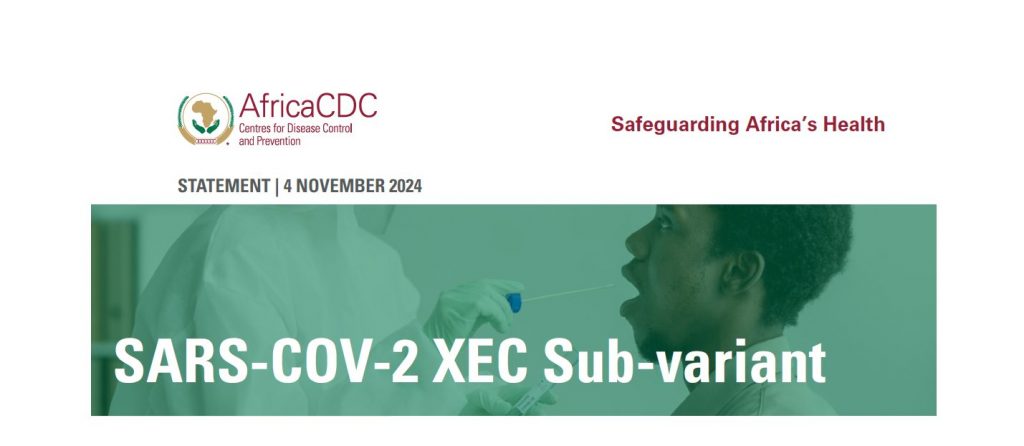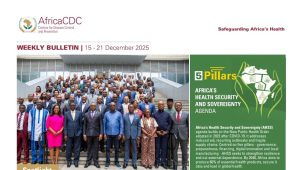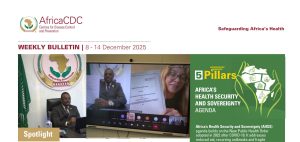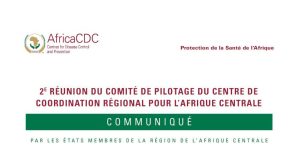Situation Summary
COVID-19 continues to spread globally and is dominated by descendant sub-variants of the SARS-COV-2 Omicron Variant. The main sub-variants of omicron circulating currently around the world include BA.2.86, JN.1, KP.2, KP.3 and XEC. The XEC variant, a recombinant of closely JN.1 lineage of KS.1.1 (JN.13.1.1.1) and
KP.3.3 (JN.1.11.1.3.3).
The XEC variant is a subvariant of the SARS-CoV-2 Omicron strain, and was first reported in May 2024. It is currently being monitored by the health authorities in other regions. XEC has been detected in 43 countries across Europe, Asia, and North America1. In Africa, Botswana reported 1 XEC case from a hospitalized European traveller. However, there is limited testing and sequencing than before, making it difficult to know the spread of XEC variant in Africa.
As of 24 September 2024, the World Health Organization (WHO) designated XEC as a variant under monitoring (VUMs). It is expected for viruses like SARS-CoV-2 to continuously mutate. A rising prevalence XEC subvariant in several countries warrants a cautious approach and strengthening sentinel and genomic surveillance in Africa.
Preliminary experimental data suggests that XEC exhibited increased transmissibility and unique mutations that may contribute to relatively higher immune evasion than the parent KP.3 lineage2,3,4. However, there is no evidence that it cause more severe illness than previous Omicron variants. XEC variant also exhibit similar flu-like clinical symptoms such as high temperature, body aches, sore throat with a cough, headaches along with tiredness are to be expected.
Recommendations for the Member States
While additional evidence is needed to determine the possible impact of XEC and other emerging variants in Africa, this statement is being sent out to increase Member State awareness of the situation. Africa CDC advises Member States and Health Authorities as follows:
- AU Member States should continue to strengthen influenza-like illness and severe acute respiratory syndrome (ILI/SARI) surveillance to monitor SARSCoV-2 cases; emergence, spread and evolution of variants and sub-variants of the virus. Request for assistance on genomic sequencing can be directed
to africapgi@africacdc.org - Africa CDC recommends AU Member States to continue vaccination with booster doses using updated COVID-19 vaccines targeting high risk groups including adults aged 65 years and above; moderately or severely immunocompromised individuals; and front-line health care workers
- All AU Member States should notify and routinely share data with Africa CDC on confirmed COVID-19 cases and variants. Notify Africa CDC by emailing: ebs@africacdc.org
Key messages
- XEC is recombinant subvariants under monitoring by the Africa CDC and the World Health Organization.
- Preliminary reports indicate that XEC variant exhibit increased transmissibility and unique mutations that may contribute to relatively higher immune evasion than the parent lineages.
- The symptoms of an infection with XEC are similar to those associated with Omicron subvariants. No evidence of increased disease severity caused by XEC variant.
- AU Member States should continue to enhance influenza-like illness and severe acute respiratory syndrome (ILI/SARI) surveillance to monitor SARS-CoV-2 cases and emerging variants.
References
- Shu, Y. and McCauley, J. (2017) GISAID: from vision to reality. EuroSurveillance, 22(13) doi: 10.2807/1560-7917. ES.2017.22.13.30494 PMCID: PMC5388101
- Yu Kaku et al. (2024). Virological characteristics of the SARSCoV-2 XEC variant. bioRxiv 2024.10.16.618773; doi: https://doi.org/10.1101/2024.10.16.618773
- Jingyi Liu et al. (2024). Enhanced immune evasion of SARS-CoV-2 KP.3.1.1 and XEC through NTD glycosylation. bioRxiv 2024.10.23.619754; doi: https://doi.org/10.1101/2024.10.23.619754
- Prerna Arora et al. (2024). Impact of JN.1 booster vaccination on neutralisation of SARS-CoV-2 variants KP.3.1.1 and XEC. bioRxiv 2024.10.04.616448; doi: https://doi.org/10.1101/2024.10.04.616448
.
Download: Statement | SARS-COV-2 XEC Sub-variant, 4 November 2024







